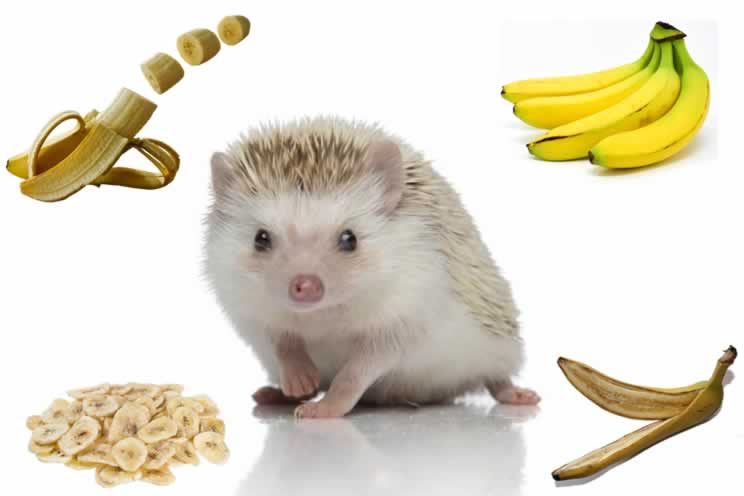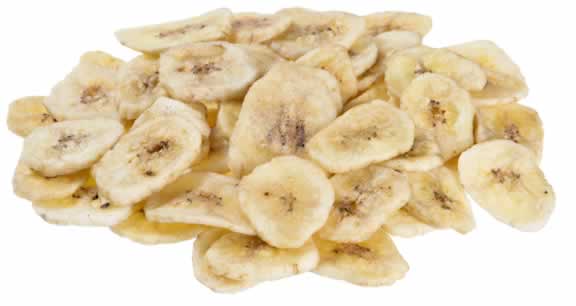
During my research into the types of food suitable for hedgehogs, fruit especially bananas was high on my list. I like bananas and know they provide a lot of nutrition, so I decided to find out about their suitability for pygmy hedgehogs.
Can hedgehogs eat bananas? Hedgehogs can eat bananas as part of their diet but only in moderation as bananas can be high in sugar, especially ripe bananas. Unripe bananas have less sugar but are not as easy to eat, so they need to be cut and mashed into small pieces. Avoid brown parts of bananas at these are over ripe containing high levels of sugar. Do not feed hedgehogs the peel or the black tip at the end of the banana.
Unripe bananas are more composed of resistant starch which is a fiber instead of more sugar as in ripe bananas. As unripe bananas contain a lot of fiber, this can lead to constipation or diarrhea. It’s best to only give unripe bananas in moderation.
We tend to give our hedgehog small pieces of banana that isn’t too ripe and also isn’t too unripe, a sort of happy medium. We only ever feed him bananas under supervision, normally when he wakes up and after he has stretched his legs.
Do not feed hedgehogs any of the banana peel, as this is probably full of pesticides. Remove the banana from it’s peel and cut into very small pieces before serving them to your hedgehog.
Early on when we had first bought him, we left some small pieces of banana in his cage and the next night when he woke up, we were horrified to see what we thought were growths on his feet. Only to quickly realize, it was nothing more than hardened banana and by doing a foot wash we were able to remove the banana residue.
The banana residue had also dried on his fur, causing it to mat and clump together. As he walked the clumped up banana mess would drag along the bedding, catching anything like his poop pieces and further adding these into his fur.
I was surprised at how quickly the banana had hardened and how it required some effort to remove. Not only would this hardened banana residue be uncomfortable for him to walk with but also quite dangerous considering he spends a large proportion of his nights galivanting on his running wheel.
So, there’s always the risk he could accidentally twist something while running, all caused by his feet landing awkwardly due to the hardened banana growths on his feet.
From then on, we decided to give him pieces of banana only when we could see him eating and this has worked well for us.
Bananas contain a lot of carbohydrate
Bananas typically contain around twenty percent of their weight in carbohydrates bound to a high proportion of water, with dried bananas containing more than 75% carbohydrate.
The carbohydrate in bananas is different depending on the whether the banana has not yet ripened compared to ripe bananas. With any foods given to hedgehogs, it is always wise to make sure they provide balanced nutrition. Having a high carbohydrate diet as their main source of food can lead to health issues.
Bananas can contain a lot of sugar
In unripe bananas the carbohydrate consists more of starch and this type of starch is known as resistant starch. As the bananas start to ripen the carbohydrates in the banana changes from starch to sugar, leaving only a residue of starch behind, around 1%.
With so much sugar content in ripe bananas, it is important to make sure ripe bananas are only ever fed in moderation to hedgehogs. Ripe bananas have a higher glycemic index (GI) to unripe bananas, which means they enter the bloodstream a lot quicker and raise blood sugar levels.
This can become serious to hedgehogs who are fed sugary foods, like ripe bananas regularly as they can end up becoming more prone to diabetes.
Unripe bananas as they contain less sugar and have more resistant starch consequently have a low GI score, meaning they don’t raise the blood sugar levels as drastically as ripe bananas do. I always aim to use bananas that have not started to go brown, as well as making sure they are not over ripe either.
Bananas can contain a lot of fiber
The type of starch found in unripe bananas, resistant starch doesn’t totally get absorbed by the hedgehog as it behaves like fiber during their digestive process and passes through undigested. With some bananas like green bananas having very high quantities of starch, with their dry weight being around 75% starch.

It is important to be careful feeding unripe bananas too often as they can cause constipation, just like with humans where too much fiber in the diet and not enough liquid can cause stools to harden and cause constipation.
It is therefore essential to limit the amount of unripe banana pieces given to hedgehogs, as they will also be eating other foods with fiber in as well, even their staple diet of dry cat biscuits contains fiber.
The dry cat biscuits we use for our hedgehog contains around 5% fiber, therefore adding regular amounts of high fiber, as found in unripe bananas does not really bode well for digestion. Especially if our hedgehog does not drink enough water to ensure safe passage of the unripe banana’s starch through his digestive system.
I normally check visually when he wakes up in the early evening to make sure when he poops, his poop pieces are not overly dry, as this could point to there being too much fiber in his diet or him not drinking enough water.
Bananas provide excellent nutrition
Bananas provide excellent nutrition with low fat and lower calorie content. A typical banana weighing 100 grams (medium size) nutritional content is shown in the table below.
| Water | 74.91 g |
| Energy | 89 kcal |
| Protein | 1.09 g |
| Fat | 0.33 g |
| Carbohydrates | 22.84 g |
| Fiber | 2.6 g |
| Sugars | 12.23 g |
Bananas are packed with nutrients like vitamins, antioxidants and phytonutrients, a complete break down of these is listed in the table below.
| Calcium | 5 mg |
| Iron | 0.26 mg |
| Magnesium | 27 mg |
| Phosphorus | 22 mg |
| Potassium | 358 mg |
| Sodium | 1 mg |
| Zinc | 0.15 mg |
| Copper | 0.078 mg |
| Selenium | 1 µg |
| Vitamin C | 8.7 mg |
| Thiamin | 0.031 mg |
| Riboflavin | 0.073 mg |
| Niacin | 0.665 mg |
| Vitamin B-6 | 0.367 mg |
| Folate | 20 µg |
| Choline | 9.8 mg |
| Vitamin A | 3 µg |
| Beta Carotene | 26 µg |
| Lutein | 22 µg |
| Vitamin E | 0.1 mg |
| Vitamin K | 0.5 µg |
Dry banana pieces
Dry banana pieces look like an easy option to provide the benefits of eating bananas but there are some important points to consider with dry banana pieces. The following list contains things to watch out for:
- High sugar content
- High fiber content
- Preservatives for longer shelf life
As the water content is minimal, the banana becomes concentrated, meaning the sugar content from ripe bananas increases, per weight of banana. When feeding a normal piece of banana weighing 2 grams, around twenty percent of this will be carbohydrate with the rest being water. Thereby at most, the level of sugar will be less than twenty percent.

Now taking a dried banana piece weighing 2 grams, as there is no water, there will be more than 75% in carbohydrate, dramatically increasing the sugar content.
Likewise, if the banana was unripe before it was dried, then the dried banana will have substantially more starch per weight than it’s undried counterpart. This could increase the chances of constipation, as it could introduce too much fiber into their diets.
Then there is the preservatives used to keep the dried bananas from going off, and these in themselves may not agree with the hedgehogs well-being.
Dried banana pieces also represent a choking hazard, as they are quite hard to break down evenly. The last thing I would want to do is leave dried banana pieces overnight in my hedgehogs cage. I am also concerned these banana pieces once broken into smaller pieces by biting, leave sharp edges, that could cause an injury to the hedgehogs mouth.
It is because of these reasons that we avoid dried bananas, in fact any dried fruits are avoided too.
Conclusion
Bananas are a great source of additional vitamins, anti-oxidants and phytonutrients for hedgehogs, however they should only be given in moderation. As bananas that are ripe contain a lot of sugar, potentially raising blood sugar levels and increasing the likelihood of diabetes. Over ripe bananas, those that have started to go brown should be avoided as these will have the highest levels of sugar content.
Unripe bananas contain less sugar, as their carbohydrate constituency is mostly resistant starch which is more like fiber. Too much fiber can cause constipation, so moderation is the key in ensuring hedgehogs can still get their nutrients from unripe bananas without overloading on too much fiber.
[1]https://fdc.nal.usda.gov/fdc-app.html#/food-details/786652/nutrients


